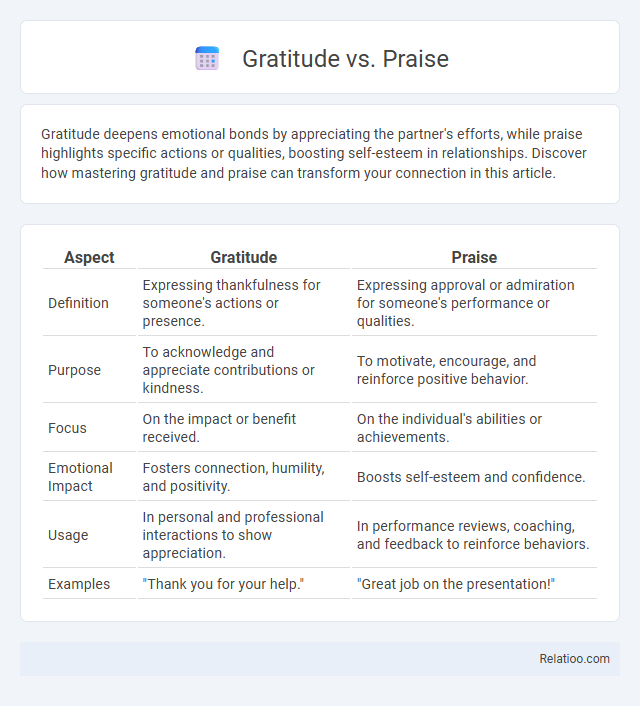Gratitude deepens emotional bonds by appreciating the partner's efforts, while praise highlights specific actions or qualities, boosting self-esteem in relationships. Discover how mastering gratitude and praise can transform your connection in this article.
Table of Comparison
| Aspect | Gratitude | Praise |
|---|---|---|
| Definition | Expressing thankfulness for someone's actions or presence. | Expressing approval or admiration for someone's performance or qualities. |
| Purpose | To acknowledge and appreciate contributions or kindness. | To motivate, encourage, and reinforce positive behavior. |
| Focus | On the impact or benefit received. | On the individual's abilities or achievements. |
| Emotional Impact | Fosters connection, humility, and positivity. | Boosts self-esteem and confidence. |
| Usage | In personal and professional interactions to show appreciation. | In performance reviews, coaching, and feedback to reinforce behaviors. |
| Examples | "Thank you for your help." | "Great job on the presentation!" |
Understanding Gratitude and Praise
Understanding gratitude involves recognizing and appreciating the positive aspects and kindnesses received in your life, fostering emotional well-being. Praise focuses on evaluating someone's actions or qualities positively, often expressed to motivate or acknowledge specific achievements. Your ability to distinguish between gratitude and praise enhances interpersonal relationships and promotes genuine emotional connections.
Key Differences Between Gratitude and Praise
Gratitude is an emotional recognition and appreciation of kindness or benefits received, often expressed as thankfulness, whereas praise involves actively acknowledging someone's achievements or qualities to affirm their value. Gratitude centers on a personal, internal feeling linked to acknowledgment of others' actions, while praise is typically external and communicative, intended to motivate or encourage. Understanding these differences highlights how gratitude fosters humility and connection, whereas praise focuses on reinforcement and celebration of specific behaviors or traits.
Psychological Impact of Gratitude
Gratitude fosters positive psychological well-being by enhancing emotional resilience and reducing stress, whereas praise can sometimes lead to dependence on external validation. Unlike praise, which often centers on specific achievements, gratitude cultivates a broader appreciation for life's positive aspects, promoting long-term happiness and improved mental health. Research consistently shows that practicing gratitude activates brain regions associated with dopamine and serotonin production, which are critical for mood regulation and emotional stability.
The Effects of Praise on Motivation
Praise significantly influences motivation by reinforcing positive behaviors and boosting self-esteem, which encourages continued effort and achievement. Unlike gratitude, which fosters appreciation and relational bonds, praise specifically targets performance and progress, making it a powerful tool in educational and professional settings. Your motivation can be enhanced when praise is specific, sincere, and focused on effort rather than inherent traits.
Gratitude in Personal Relationships
Gratitude in personal relationships fosters deeper emotional connections by recognizing and appreciating your partner's efforts and qualities. Unlike praise, which often highlights specific achievements or attributes, gratitude emphasizes heartfelt acknowledgment of ongoing support and kindness. Cultivating gratitude helps build trust, enhances communication, and nurtures long-lasting bonds.
Praise in Educational and Workplace Settings
Praise in educational and workplace settings plays a crucial role in motivating individuals and reinforcing positive behaviors. Unlike gratitude, which expresses appreciation for someone's actions, praise specifically acknowledges achievements and efforts, boosting confidence and encouraging continued success. Your strategic use of praise can foster a supportive environment that drives productivity and enhances learning outcomes.
Potential Downsides of Excessive Praise
Excessive praise can lead to dependency on external validation, reducing Your intrinsic motivation and resilience. Overpraising may cause inflated self-esteem, resulting in complacency and a fear of failure. Cultivating genuine gratitude fosters a balanced mindset, encouraging appreciation without the pitfalls linked to constant praise.
Cultivating a Habit of Gratitude
Cultivating a habit of gratitude involves recognizing and appreciating the positive aspects of life rather than merely offering praise or generic thanks. Unlike praise, which often acknowledges specific achievements or qualities, gratitude fosters a deeper emotional connection by valuing experiences and relationships holistically. You can enhance your well-being and build resilience by regularly practicing gratitude through mindful reflection or journaling.
When to Use Gratitude vs Praise
Gratitude is best expressed when acknowledging someone's kindness, support, or positive impact on your life, emphasizing appreciation for their actions or presence. Praise is appropriate for recognizing achievements, skills, or efforts, highlighting specific accomplishments or qualities worth admiring. Using gratitude fosters relational warmth and acknowledges goodwill, while praise motivates improvement and celebrates success.
Integrating Both for Holistic Well-being
Gratitude involves recognizing and appreciating the positive aspects of life, while praise is the act of expressing approval or admiration towards someone's actions or qualities. Integrating both gratitude and praise fosters holistic well-being by enhancing emotional resilience, strengthening interpersonal relationships, and promoting a positive mindset. Cultivating gratitude internally and offering sincere praise externally creates a balanced approach to mental health and social connection.

Infographic: Gratitude vs Praise
 relatioo.com
relatioo.com